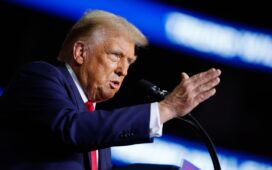After the huge general sigh of relief that the political turmoil in the USA of the last month is now over, the focus is rapidly turning to what exactly the new President Joe Biden’s policies will be to pull his country back from the Covid abyss. Aside from the obvious direct assault on the virus itself, he will need to deal with the major economic problem it has caused. One of Biden’s solutions to this is a greater emphasis on green technologies and in particular electric vehicles. However, Biden’s greening of America faces a more uphill battle in the EV market compared to China’s. Here’s why.
Can President Biden’s green focus steal the volume EV market from China. (AP Photo/Mark … [+]
ASSOCIATED PRESS
There are lots of positive policies in the pipeline. During his campaign, Biden pledged to restore the full federal tax credit for electric vehicle purchases. This will be great for GM and Tesla, which already used theirs up a year ago. Biden also proposes to convert all 500,000 US school buses to electric by 2030. The pledges around infrastructure are vaguer, with a call for a national network of 500,000 electric vehicle chargers, but no clear plan yet for how to get there. However, some of the $50 billion earmarked for roads and highways might include this.
There will be $5 billion of the $300 billion Build Back Better plan aimed at battery and energy storage to improve the range and reduce the cost of EVs. There will be a 10% tax credit for creating American jobs in the automotive industry, with specific mention of retooling a car factory to produce EVs. There are indications that the Californian framework of increasing fuel efficiency by 3.7% each year will be rolled out across the entire US, which will inevitably lead to manufacturers producing more hybrids, plug-in hybrids, and battery EVs.
This is all great news for EV adoption, and there’s no denying that the incoming Biden administration will be much more favorable towards green technologies than the outgoing Trump one, which presumably wanted to return to steam engines running on “clean coal”. But the big immovable object all these plans will face is the intransigency of the American car buyer and automotive industry in general. This problem isn’t exclusively American; it’s replicated all over the developed world, including Europe and Japan. Just a few minutes on a public forum discussing EVs will show just how much resistance there is to this disruptive technology from a wide variety of directions, and anecdotal evidence is borne out by recent statistics.
Americans are not that interested in buying EVs.
Continental
The 2020 Mobility Study performed by Continental, which has been running since 2011, has shown that, in the US, only 44% of those surveyed can see themselves driving an EV in the future, compared to 50% who can’t. Germany, France, and Japan are even more skewed towards not wanting an EV in the future, even though European EV sales outstrip those in the USA – over half a million compared to under 350,000 in America.
Chinese people are much more interested in EVs.
Continental
Contrast this with the Chinese figures. In China, 86% of people want an EV in the future, compared to around 12% who don’t. It should be noted that this survey is urban weighted in China, but the difference is still very stark and hints at a regular paradox we see in the adoption of new technology. When new technology requires a big change in culture and disrupts incumbent industries, developing nations have an advantage over those that have already developed, which have a lot more to lose. Think how much cheaper it is to build a new house with the latest practices and technologies than retrofit those into an old one. A recent example is how developing nations have eschewed wired broadband infrastructure and gone straight to wireless data instead.
There is a parallel with EVs in China, where there is a much smaller legacy of fossil fuel industry to contend with. Huge incumbent manufacturers aren’t having to reskill workers from mechanics to electronics – they’re skilling them to electronics from the word go. Traditional component supply chains won’t be destroyed – new ones will be built from the ground up. Many of the EV buyers won’t be buying an EV reluctantly to replace a much-loved fossil fuel vehicle. This could be their first car, let alone their first EV.
Chinese companies like Wuling are already producing very cheap EVs for the volume market. (Photo … [+]
Barcroft Media via Getty Images
China also has a lower cost of entry for EVs, although this does need to be weighed up against salary differences. The average income in the US is around $66,000 compared to around $10,500 in China, so the $4,200 price of the best-selling Chinese Wuling Hongguang Mini EV is equivalent to a $26,000 vehicle in the US relative to salary, ironically close to what Tesla is aiming for with its much-anticipated ‘Model 2’. Nevertheless, as I argued in a previous column, Tesla is still very much at the luxury end of the market and it’s far from clear that it will be so dominant a brand as EVs become a mainstream mass market commodity. In China, its range advantages are less important because fewer than 1% of all passenger vehicle journeys exceed 75 miles anyway, according to Rupert Mitchell of Weltmeister. This makes even low-range EVs more viable for Chinese buyers, who on average drive just 697 miles a year, compared to 13,474 miles in the USA.
So EVs are a more viable transport option already for Chinese buyers, but the battle Biden and America faces if they are to succeed in the global EV market is against the reluctance of drivers to change their habits, and the negative campaigning by the gas and oil industry. When pickup drivers “coal roll” Tesla drivers on US highways, they aren’t defending American jobs in the long term. They’re keeping the fossil fuel status quo and giving China more of a chance to get a lead over the USA in this crucial emerging market. While Tesla is likely to keep its technological advantage at the bleeding edge for the foreseeable future, the mass market is about affordability. That requires high volume, and despite Biden’s greater EV favor, China’s market is already larger and likely to grow faster by unit sales too.
Tesla has started selling Chinese-made Model Ys in China, but it’s still very much in the luxury end … [+]
VCG via Getty Images
Of course, the elephant in the room in any comparison between China and the US is politics. Under Joe Biden, America can more confidently reclaim its status as a bastion of world democracy, whereas China is the opposite, with a terrible record on human rights. But economics tends to ignore politics with alarming regularity. However we may feel about communism, someone who buys cheap but decent quality products has an economic advantage over those who don’t. The sheer volume China will be capable of in the EV market is going to be hard to beat. Remember how Japan started to dominate the fossil fuel car market from the 1970s, despite all the slurs of inferiority? That could easily happen with EVs, unless we put more effort into encouraging the switch than the current incentives planned by the Biden administration, or those of other developed nations.








